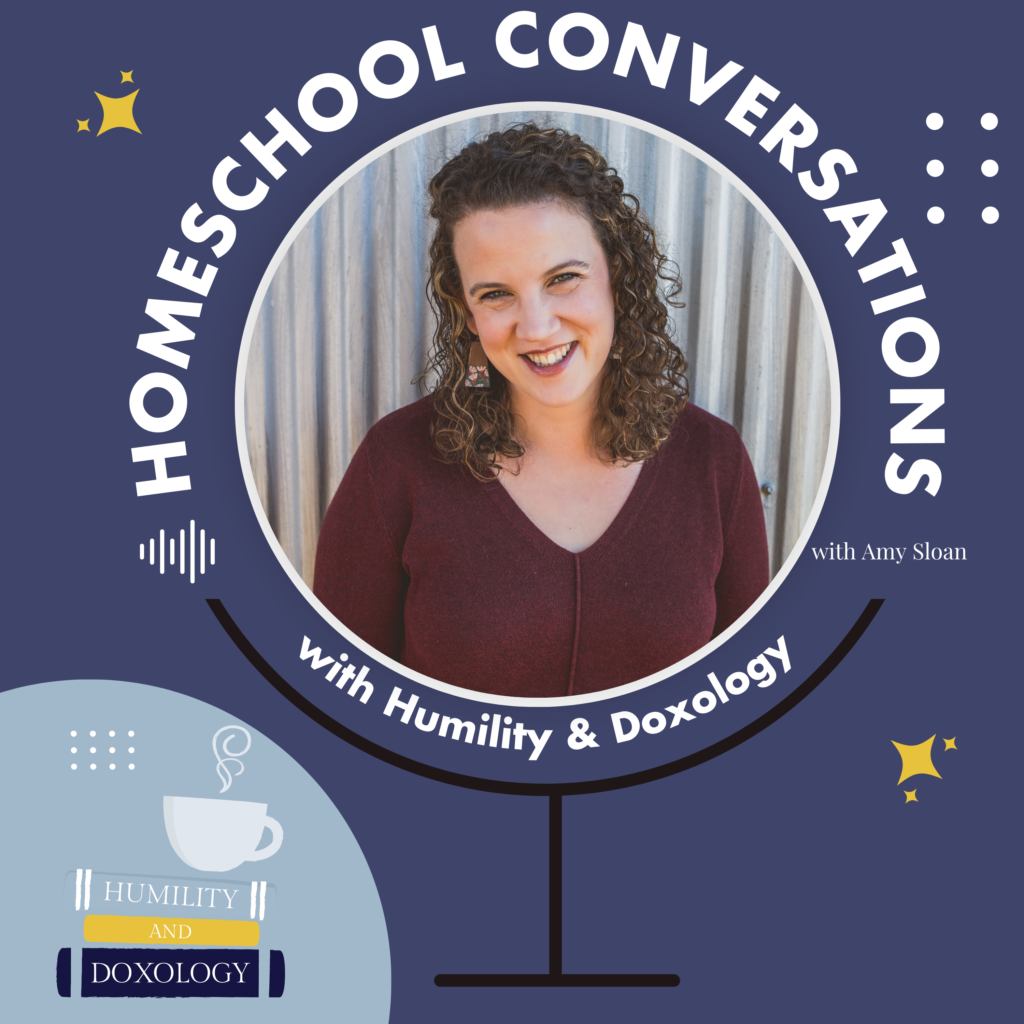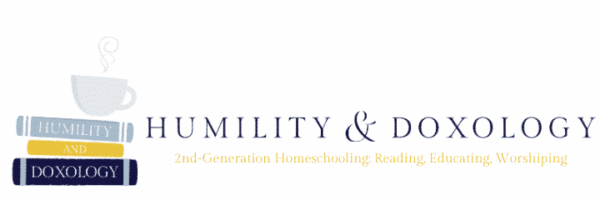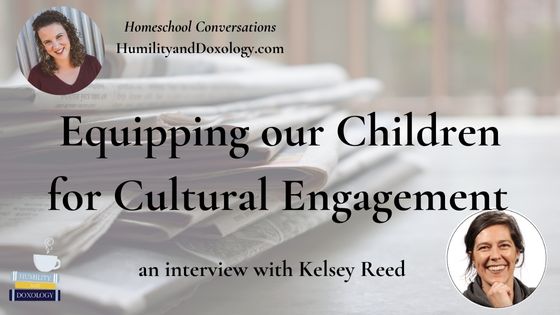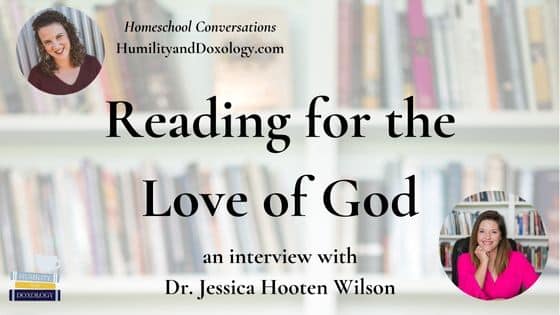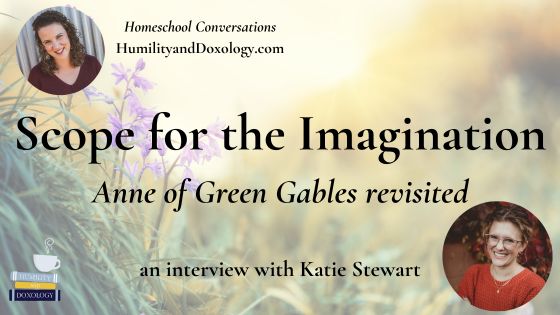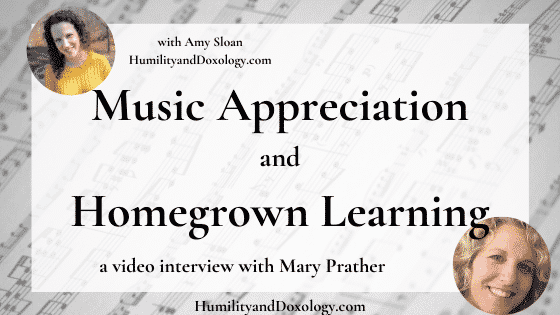As Christian homeschool parents, it is easy to feel overwhelmed by the constant onslaught of news and cultural issues our families and children face each day. How can we equip our children to engage with the culture in a way that rests in the Truth of Scripture and confidence in the character of God? How can we teach them to think through culture with calm discernment, not anxiety? Kelsey Reed is the news coach with God’s WORLD News, and she joins us on this podcast bonus episode to share her vision for equipping parents for this vital role of discipleship.
Be sure to check out all the other interviews in our Homeschool Conversations series!
Watch the video. Listen to the podcast. Read the show notes. Share with your friends!

{This post contains paid links. Please see disclaimer.}
Who is Kelsey Reed?
Kelsey Reed and her husband, Chip, and their three daughters live in Western North Carolina. There they revel in the beauty of creation, creature, and culture, and the one who is Lord over it all. Kelsey is also the news coach at God’s World News and the host of the brand-new Concurrently podcast.
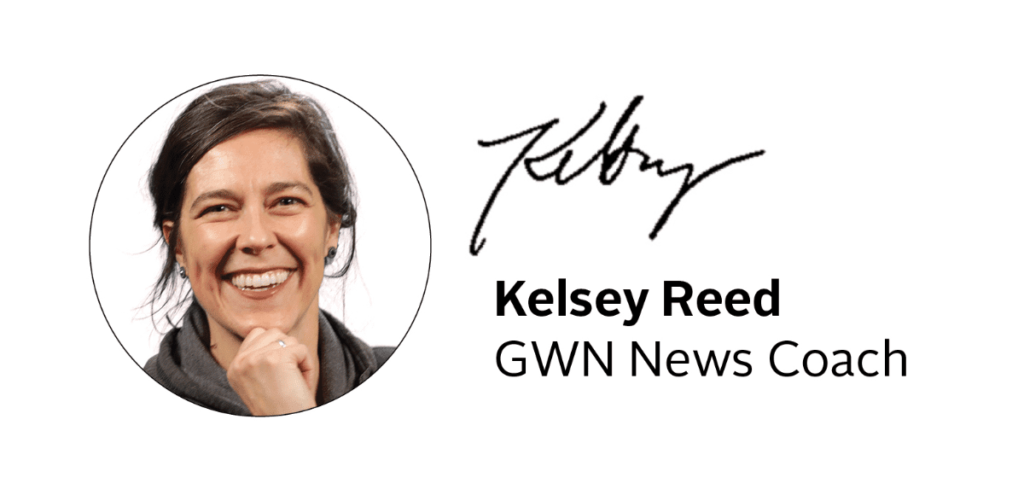
Watch my Homeschool Conversation with Kelsey Reed
Prefer to listen to your content? Subscribe to Homeschool Conversations on Apple podcasts or wherever you get your podcasts so you don’t miss a single episode!
Amy: Hello, friends. Today I am joined by Kelsey Reed. Kelsey and her husband, Chip, and their three daughters live in Western North Carolina. There they revel in the beauty of creation, creature, and culture, and the one who is Lord over it all. Kelsey is also the news coach at God’s World News and the host of the brand-new Concurrently podcast.
I’m so delighted to have you here today, Kelsey. I’d love to be able to just hear a little bit about yourself and your family beyond the official little bio there and how you first got interested in the news.
Kelsey Reed: Amy, thanks for just letting me join you today. What a privilege to be able to chat about the things that we’re doing and that we’re learning right now at God’s World News, and specifically in this role at God’s World News called News Coach.
First, a little bit more about me and my family in the non-canned sense. I have three daughters who are 18, 16, and going on 18, no, she’s actually going on 8, but she does want to try to catch up with the teen sisters in her life. We are parenting at both ends of the spectrum right now. One who’s about to fledge, to college in the fall, and a little one who is making her way up through elementary school.
A little bit more about our family, we have been in vocational ministry. I’m a pastor’s daughter, was a part of my family of origin. I was homeschooled on and off through the years, and we’ve done the same pattern with our own children homeschooling on and off, depending on our context and the needs of our family in those certain seasons.
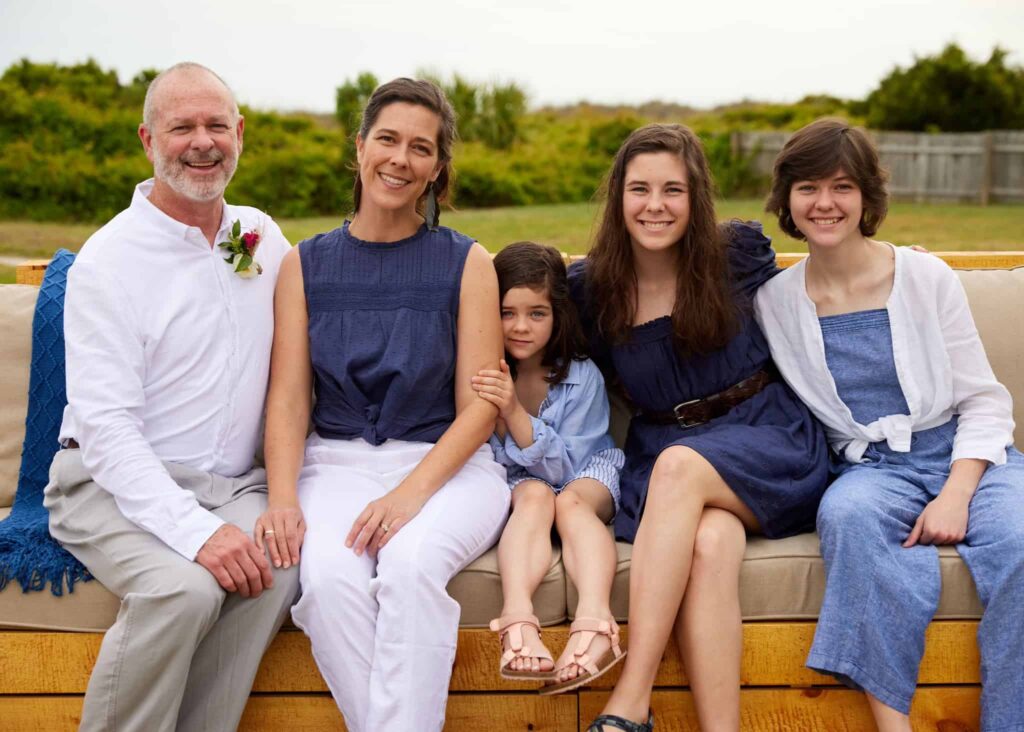
I’m a big fan of the process and of the just being reminded that no matter whether our children are in homeschool as their permanent educational situation or whether they have made forays into other educational systems, we are always discipling schooling at home and so I am a big encourager of remembering you are always intrinsically involved in the education, the discipleship of your young people.
Moving into this idea of the news and what got me into the news, and I have to be frank that the news was not the thing that was most compelling to me or even what drew me into this position. I grew up with a mom who watched every scrap of news that could be allowed like it was a limited amount of news back when I was a kid. She had it on whenever it was on, and that as it was, was more than enough for me.
I’ve been someone who loves the slow read, the chance for a slower digestion of input. I bring that posture with me into what I do and I’ve learned to love the news for the snapshot that it is of humanity instead of necessarily for what it is in and of itself.
I place it into the larger picture, the bigger story of human processes and again, it’s a snapshot of where we are to date in culture, what we think about ourselves, what we’re reporting about ourselves, what we proclaim as important. I just happen to also have found the exact perfect place to be in a relationship with the news, which is in our enterprise that seeks to tell it in a Godly way. We’re seeking to tell those things that we need to report on what’s happening in the Lord’s world, recognizing that it is His world. I’ve come about my relationship with the news in a circuitous way that went through education and the slow process and now is starting to understand how to engage it from that posture.
Amy: I appreciate that perspective and I hope that encourages a parent listening who’s maybe thinking, I don’t really care about the news so much, or I find it overwhelming. This idea of discipleship and being able to come in from a posture of who we are in a world that God made. It does not mean that you are the person who’s just naturally interested in the news? There’s a place here for every parent, and in fact, it’s an important place for every parent to be.
Kelsey: Yes.
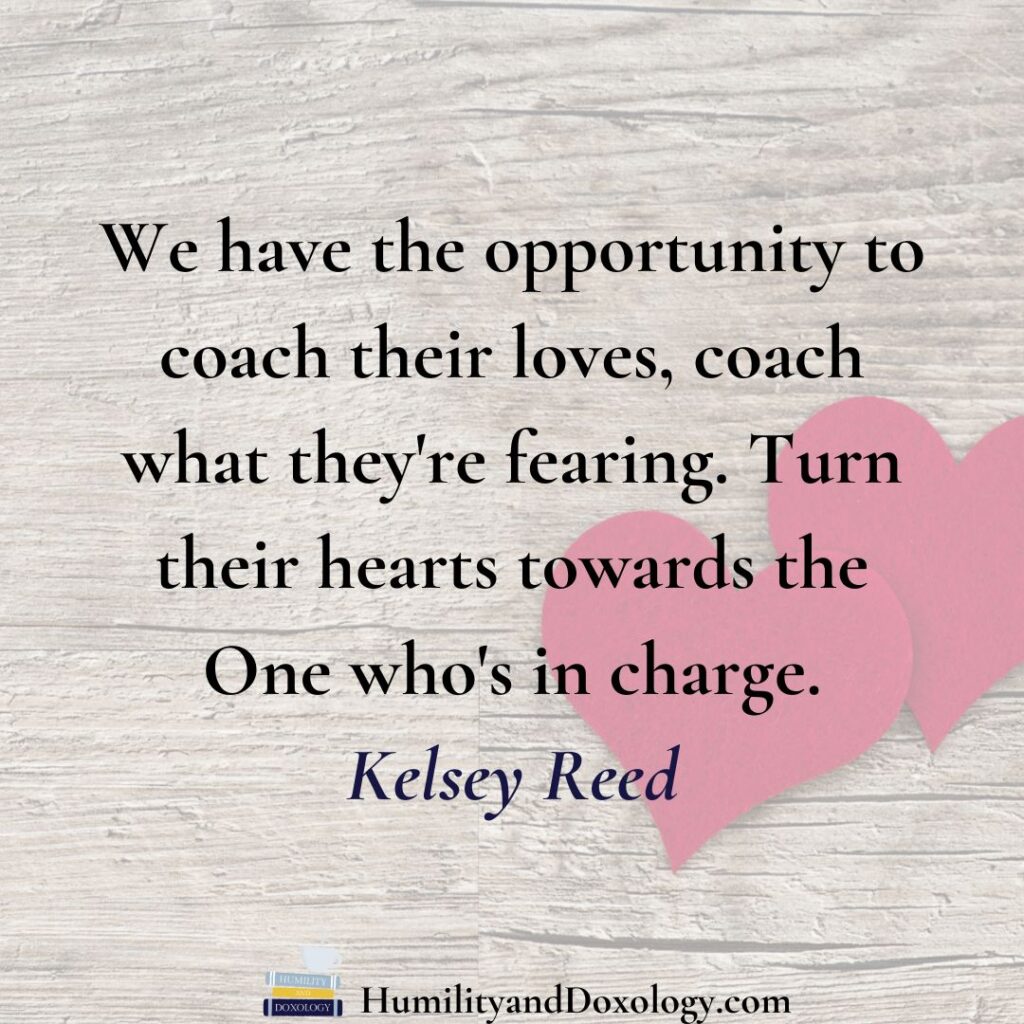
Challenges Christian parents face as we navigate the news with our children
Amy: Speaking of Christian parents, what do you see are some of the challenges we face as we navigate this– It seems like a tricky medium of news because especially these days, it seems to bombard us from every side. You were talking about your mom growing up, she would have the news on, but there’s still limited news and now it’s coming at us from social media and podcasts and television and even ads as we go on Google or whatever. How are we supposed to navigate this wisely with our kids?
Kelsey: Yes. When you think of the challenges that– You’ve hit the nail on the head when you say that we are bombarded by it. It’s the barrage in and of itself that is the problem. There are other problems too, but I think that when we have an opportunity to slow down for our digestion of the input, it allows us to put it in its place and to wrangle it well. The amount of channels that are open for information right now, the amount of information that flows through those challenge, that constant access to information and content is one of the greatest challenges of our age. There’s a good reason why we call this the age of information, we truly are that.
For parents, for teachers, how do we engage in this age with a sense of hope and confidence? How do we identify those challenges and meet with them?

A secondary challenge that I thought of as I was considering that content fire hydrant as it were, is that at times because of that constant flow, we’re actually not able to reflect on the agendas or the worldviews, the ideologies from which that content is coming. We’re not able to source that idea of who is behind this specific narrative or even what is this specific narrative. A major thing that we need to do is just that creating of the rhythm of content absorption, content digestion, and something that in educational circles, we like to call building reflective capacity.
We’re not just drinking from that fire hydrant, we are cutting off the flow to be able to absorb, maybe gulp down and think about what we have already just received and to interrogate it to work the content is another thing that we say. That is a little piece of the challenge and maybe a big-picture sense of how to begin to meet with those challenges.
Amy: That’s really helpful to think about. Even forget discipling my children, just even as an individual to be able to just pause and if you think about water flow, you got to like take the flow and put it into a more narrow container, slow the flow down, get a filter in there, take only what you’re able to actually to digest and absorb and be thoughtful and wise about.
Kelsey: Yes, hydration is good, but we can’t take it all at once. We need it out over the course of a day. As you’re thinking about that and the words for our own discipleship not merely the discipleship for our children and what we’re feeding to them. I think of that image of the bird feeding a baby bird. That’s often something that comes to mind. What is my job here? I need to feed myself. I need to consider those rhythms of my discipleship, and I need to also be feeding those rhythms into my child’s life.
One of the massive concepts that we see in scripture that shapes our posture, shapes our rhythm of discipleship are those rhythms that we’re just set from the dawn of time by our Creator who sat down when his work was finished in creation and established for us humanity. He established rest for us. It is not good for man to be always at work. We sleep, the lights go off, the sun goes down, he created rest. The Psalms even say he gives to his beloved sleep. He gives us rest out of his love for us. Out of our love for our children, how also are we giving them those moments to rest and those rhythms of rest?
Amy: Modeling and teaching them that being a creature and being finite is actually a gift from God. It’s when we rest in who he made us to be, that we’re actually able to joyfully and productively live in this world that he’s made.
Kelsey: Yes.

Should we shield our children from the news?
Amy: I can imagine someone listening and saying, okay, yes. I can see, I agree with you on all these ideas when it comes to my life as an adult, grownup listening and processing and thinking carefully about the news but isn’t it better to just completely shield our children from the news? There’s so much nastiness so shouldn’t we just avoid it with our children? What would you say to that question?
Kelsey: When you talk about nastiness the first thing that actually comes to my mind right now is actually Twitter. Now, for better or for worse, I have a presence on Twitter, which is brand new to me and not my style. Yet, because of its certain form, it is the place for sharing content, that’s word content, and so to use something, and to shape it from my posture, and to learn the disciplines of engaging it without succumbing to the nastiness, for me, and for my growth, that was a place that I needed to engage. It’s a challenging place and challenge, it can get so high that there is no growth that comes with it. We have to be careful about how much challenge we’re biting off at one time.
When I think about parenting, it’s the same thing. We do not grow without challenge. Our children will not grow without challenge in their life. Also, if all of that challenge comes at once when they leave our homes, that’s too great of a challenge for them to operate under with discernment and wisdom. We’re meeting out the challenge, we’re mitigating it, I think is the word that I’m looking for, where we give them a little bit at a time, and we allow them to stand back, reflect on what their experiences were. Think about their thinking, think about what they felt, think about what they’ve done, with an abundance of grace under our shepherding, allowing them to fail while they’re still in our home.
I’ve used this so many times in past conversations, and people are going to start calling me the candy queen. That sometimes we let our children experience having too much sugar, and we walk them through, how did that make you feel? How did your tummy feel after that? Did you have a headache? Is similarly when we are looking at this world, it’s so important for us to give them a little bit of a sense of what it means to be too steeped in that while they’re not fully steeped in that if that makes any sense.
We definitely need to figure out within our own home with the children who are in front of us. How much challenge is too much challenge? What do we still need to shield them from?
What is a developmentally sound way of giving a little bit of a sense of what it means to operate in the world with wisdom?
I’ve used as a metaphor before, Corrie Ten Boom’s story of her father, it’s such a good one for explaining this. Just that for a time our parents carry something that is too heavy for us, and then when it is developmentally appropriate, we give that challenge into their hands.
Amy: You’re not saying we just take our sweet little children and throw them into the morass of the sewer, right?
Kelsey: None of that.
Amy: We need to take a little bit of drop of the sewer water, put it on a microscope, “Okay, let’s examine this together, but in a way that is safe and not going to contaminate them.”
Kelsey: That’s right.

How do we teach our children to respond to current events with discernment?
Amy: Okay, so these are big ideas. These are the philosophies of how we think about it, but how do we do this in real life, in our daily family life? How do we teach and equip our children to see the news and not just react with their emotions, but to be thoughtful, to be discerning, to not just accept everything that is put out there as truth, but to compare it to the truth of scripture? How do we actually do that?
Kelsey: There are a couple of things just in what you’ve said. I want to try to name them so that I can return to them.
First of all, you’re talking about putting something under the microscope, that brings to mind what it means for us to examine, and for us to question, and for us to investigate. The investigative processes require that we ask, that we interrogate, and we’re asking the question. I want to talk a little bit more about that in a minute.
The other thing that you’ve talked about is the tendency for us to react. We are persons who are not just heads on sticks, that can only engage then or will only engage in that examination or analytical mode that we need to.
We’re also hearts, the part of what it means to be whole persons is that we are minds, we are bodies, we are hearts, and so we will respond and react on an emotional level to the things that come near us. We need to actually be able to engage on each of those levels and even engaged through each of those levels.
Let me try to break some things down, not so generalized. I’ve named them in a generalized sense, but I want to do that in some more– With some greater specificity. Let’s start from the heart.
Because often, right now we’re talking about things that are highly anxiety inspiring in the news. We will read something and from the very get-go, we’ll have a fear response, or we’ll have an anxiety response, or we’ll even have an anger response. As we’re engaging a story with our children, and we see that they are uncomfortable showing in their bodies, or showing with their words, or showing with their tears, something that shows that there is an emotional engagement that is going on. We bring them through what’s called the learning cycle, allowing their learning to go deeper by asking them questions. How did this make you feel?
Helping them to name I’m angry, I’m sad, I’m frustrated, I’m anxious, and allowing scripture to help us to affirm those emotional responses that our children are having. For example, we should be sad when we read about war. We should be angry when we read about the destruction of life within the womb. There are appropriate emotional responses that we are coaching, that we are affirming in our children as we read the news. That is an opportunity actually, that we have for discipleship that is given to us by reading those stories. We have the opportunity to coach their loves, coach what they’re fearing. Turn their hearts towards the One who’s in charge.
Run all of the stories that we’re looking at through scripture for finding those things that we can affirm in them, and even those things that we can affirm in the storytelling. Again, we will ask questions as a part of how we do that. We’ll ask as we look at a story, what does this reveal of what’s broken in the world? How does that line up with what we know to be true in the Biblical record, in what God says about himself? What God says about man? Listening to your story, for example, about what it means to engage in social media. There is something of the desire to connect relationally that is a part of our image bearing, a part of our design.
We can affirm that that desire to connect is good while saying– Asking our children, how is the best version for connection? How were we designed to connect? Where do we see that? We’re doing that movement from heart response, head engagement, having it shaped by our Truth that gives us our forms for how we can affirm.
Amy: No, I love that, and I love how you both communicate that it’s good to teach our children to understand and be able to process and identify the emotion that they’re experiencing as they hear a news story. It would probably be a valuable exercise for adults as well. Then, say, “Okay, why are we angry?” Sometimes we’re angry at injustice or something that angers God and to be able to see that’s good, but let’s remember who God is, and that’s where I often will go to Psalm 2, with my children. Because God is not sitting in heaven wringing his hands over the injustice of this world, it says that He laughs at the evildoer, because He is in control.
I go there for such joy and to see that parallel too in Proverbs 31 it says, “The wise woman can laugh at the days to come.” It’s not in a mindless giggling like this is funny, but there’s a sense of joy and confidence that comes when you know who is on the throne, and you can compare this light and momentary affliction, this new story to what is eternally true.
Kelsey: Amen, sister. That’s steeping in the word. Thank you for the way that you bolster my hope and joy. That is the way that we were designed. A relationship that is operating as it was intended is that relationship where we reflect to one another, the goodness, the truth, the beauty, all of those things that we speak about in Philippians 4. What does it look like for us to echo those into one another’s hearts? It’s not merely that logic examination that I was speaking of, even when we’re examining our hearts but it’s the steeping in the scripture to form our loves, to form our confidence, to bear its fruit.
What you’re speaking about, joy is the fruit of the spirit. It’s a part of the fruit of the spirit born up in us as we get into closer and deeper relationship with Him, as our intimacy with Him increases. Yes, how do we bolster our confidence, our hope, our joy by steeping ourselves in Him, the one whose world this is.

Approaching the news with a tender heart
Amy: I know that in my own sinful heart, sometimes I turn more towards cynicism than I do towards confidence, and maybe not as much with our very young children, but as they get older, sometimes you can see that sinful tendency developing in their heart as well. Do you have any tips for how we can approach the news without cynicism, without this just like, “Oh, yes, there it goes again, this evil world,” and really be able to engage with these stories and the world around us with hope and a tender heart?
Kelsey: Well, correct me if I’m wrong, but my understanding is that cynicism was something that developed in philosophy that had to do with a questioning. I think that if we were to stay in a cynical place that would do us harm. A place that we are constantly questioning and never allowing for the answers of the Word. I’m thinking of Job right now as I say this, so let me just tell you where I’m casting around in my brain that this response of the Lord’s to Job’s questioning. He had become cynical through pain, through trauma. He was just at the depths of despair. That questioning that can turn us to cynics and to dry cynics, not just the live-questioning ones who are wrestling with the Lord and with His Word.
The questioning in and of itself is not harmful unless we do not turn to the magnificence, the mystery, the majesty of the Father, and his answer to human questioning, which sometimes is not as clear as we’d like it to be. I know it wasn’t for Job, and yet it left him in awe. It was in facing the majesty, the mystery, the magnificence of the Lord. It was in his awe that new life welled up in him and his heart was made tender towards the Lord.
You talk about tenderheartedness. I believe that the Lord makes us soft and more teachable to Him, not necessarily by explaining Himself thoroughly to us, but by saying, I am God and you are not. Let me put my hand on you. Let me hem you in.
I think of Psalm 139 quite a bit when I think of that, and that is not the happy, happy, joy, joy that we might be longing for. Yet it is maybe that beginning place, that initial movement towards joy, as we are hemmed in by the one who is God. The one who knows us most intimately and who’s big enough for our questioning.
Amy: Yes, I have never thought of the Book of Job in context with– It’s a very personal story, but also you’re exactly right. It has such tremendous implications for much bigger issues. Psalm 139, that’s one of my favorites. That was one of the first longer passages of the Bible that I personally remember memorizing as a child. It was one of the first ones I memorized with my kids. It was when they were little, but it’s been a while. I bet my youngest son probably doesn’t remember it. I need to bring it back out into our memory work routines.
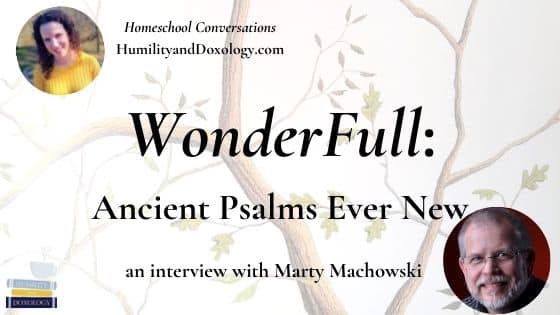
Kelsey: That’s what it’s all about, is the iteration and the reiteration. Israel forgot, in spite of being reminded over and over and over again not to forget, Israel forgot. We forget, we have to just be constantly allowing all of his Word to wash over us in each new season, shaping us anew. What a lovely thing. I love that, that’s in the memory work for your kids. It’s such a rich Psalm and as all the Psalms, I think they help us. They connect us to these varied emotional places that we are. They shape our emotions, they keep us soft.
Amy: They teach us the wide range of human experience, right?
Kelsey: Yes.
Amy: There is nothing that is happening now as we read the news that God’s people have not already experienced and they’ve brought to the Lord and he has met them there.
Kelsey: Nothing new under the sun.
God’s World News Coach and Concurrently podcast
Amy: Exactly. Well, Kelsey, what are some of your primary goals with your work as a news coach and then with the new Concurrently podcast? Can you tell us more about both of those things and how it can benefit home-school parents?
Kelsey: Yes. As a coach, my desire is really to be an encourager. I want to come alongside. I want to be one of those voices of affirmation and of reminding, gently reminding, of offering tools, of offering, like I said, the encouragement and the recognition that we are all learning together that the Lord in his bounty has made provision for us to learn this time, that we’re given this gift of time. We sometimes don’t feel like it’s a gift, but this moment of what it means to be human. We are time bound. We don’t know everything, we learn over the course of the years that are allotted to us and he created, designed us exactly for that.
I want to remind those who listen to me, those who read my writing, that this is what it’s all about. It’s about learning. In my belief, I believe because of the largesse of the Father, that that’s what we’re practicing for eternity. That we are going to be learning Him for all of our days leading up to our resurrected bodies and in the Eschaton, as they say, when heaven and earth are made new, we’ll still be learning. Yes, my goal as a coach to encourage in this process of learning, to hopefully fall in love with learning. To encourage others to fall in love with learning. To have hope in it because it is the thing that the Lord has designed for us.
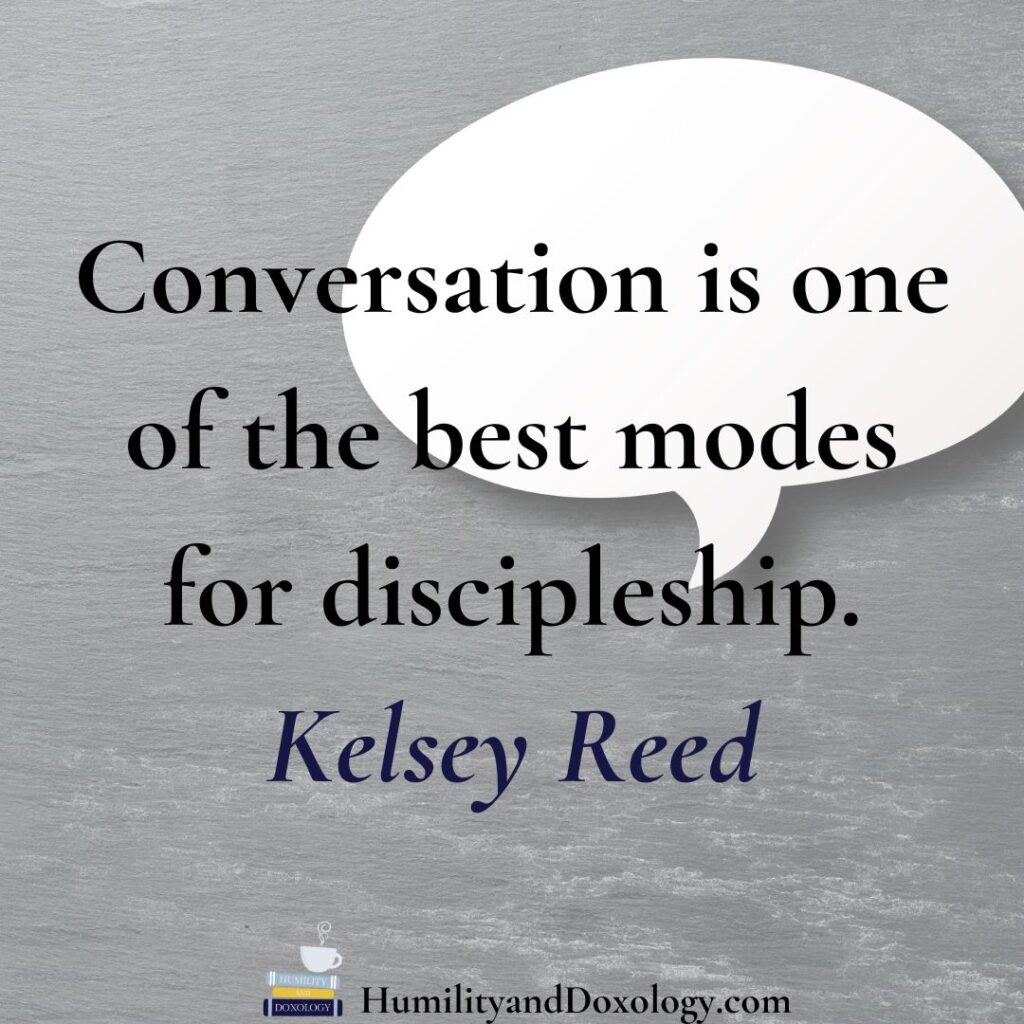
In Concurrently, we want to be that voice of encouragement, of non-anxiety, of supply. We want to offer tools, we want to model conversations. The things that I hope that people are doing at home that I want to affirm are just that one long conversation, as I know our brothers and sisters at Axis call it. This is a great source if you don’t know it yet, the culture translator, the roundtable discussion, and the one conversation at Axis where they talk about.
Conversation is one of the best modes for discipleship. We want to model it, we want to affirm it, we want to say it may feel ordinary, it may feel mundane, but these are the most transformative practices that you can engage in your home, in your classroom.
Amy: It’s so encouraging, too. I hope as people are hearing you, they’re encouraged that it doesn’t mean that you, the parent, have to suddenly become an expert on all the things in order to be able to disciple and train your children. You don’t have to have all the answers. Sometimes just modeling for your children that posture of learning, that posture of humility that you know what? There are things mommy doesn’t know, I don’t understand but I will learn, we can learn together. I will go find the answer and come to you. When I don’t know the answer, we can pray together. That’s what you’re going to be able to come along and be that partner, to be a place that parents can learn and be encouraged.
Kelsey: That’s exactly right. I’m thankful for you to draw that out of this conversation too. That it is our firm belief that parents are perfectly placed and fitted and equipped of the Lord to engage their children. The work of discipleship, parents, it’s ours for our children until the day that the Lord ordains for them to leave and to go into the world and to be those who help to shape it and who are out there learning in a different way but our children were placed in our home for a purpose. Some of that purpose is that we would learn from them. That we would be shaped and sanctified by their presence in our home. Yes, we’re co-learning along with them.
Let’s adopt that posture of confidence that it is exactly as the Lord intended and humility in that we have plenty to learn.
What is Kelsey Reed reading lately?
Amy: Definitely. I will definitely put links to Concurrently and to your written work as the news coach in the show notes for this episode but here at the end, I do want to ask you the question that I ask all of my podcast guests, which is just what are you personally reading lately?
Kelsey: The big question. I love this question. It’s such a good one. I hope more and more people will ask it because we get a chance to grow from one anothers responses. I’ve mentioned that I like the slow digest. From my personal reading I am slowly digesting two non-fiction works. One of them is The Rise and Triumph of the Modern Self by Carl Trueman. He speaks a synthesizing philosophy to this point and talking about the fruit of it in this age. I am probably in Page 150 of maybe 400-something volume, and I’ve been reading it for many months, but it is excellent and just challenging work.

The other slow non-fiction read I’m reading right now is John Frame’s, Theology from Three Perspectives which is talking about tri-perspectivalism, that sounds a lot more complicated than it really should be. It’s recognizing that we can learn about this world through multiple different perspectives because the Lord who sees things from all perspectives still grants to us a way to think his thoughts after Him and to understand Him that He is knowable. His world is knowable. Another excellent and rather slender volume, even though the title is not slender. I’m not even sure that I put the entire title in there correctly. [crosstalk]

I’m always reading after my 16-year-old who reads probably 60 books a year. She’s always handing me something, so I’m trying to read after her, Brandon Sanderson. I read fiction a lot more quickly than non-fiction. He’s an interesting author who is also a creative writing teacher out in Brigham Young University, and he writes prolifically, so I’m trying to catch up with her.
Then I’m reading The Story of the World with my seven-year-old, and I’m so thankful for the simple engagement with history that helps keep me on track with where we are in our flow. It’s so good to go all the way back to ancient history. Remember again, there’s nothing new under the sun. We’ve spoken of that already. History is a great place to find perspective, so I’m doing that as well. [chuckles]
Amy: Your 16-year-old and my 15-year-old would have a lot to talk about. My daughter loves Brandon Sanderson’s works as well. Just today she had finally gotten on hold at the library, the newest book. On her way to French class today she was telling me all about the spoilers and the connections, and I haven’t actually personally read the series, so kudos to you, but I do talk to her about it anyway.
Kelsey: It’s a heavy commitment. Hundreds upon hundreds of words.
Amy: There is a lot of words.
Kelsey: Yes.
Find Kelsey Reed online
Amy: Kelsey, where can people find you all around the internet?
Kelsey: We’ve mentioned that the podcast came out today. You can find out wherever you get podcasts. It’s called Concurrently the News Coach Podcast from World Radio and God’s World News. Also, my written work can be most easily found at gwnews.com/newscoach. That stands for God’s World News, so gwnews.com/newscoach.
Amy: Great. I will put those links in the show notes for this episode over at HumilityandDoxology.com. Kelsey, thank you so much for taking the time to chat with me today. I know this is going to be a real encouragement to other parents.
Kelsey: It was a real pleasure. Thank you for having me, Amy.
You may also enjoy my conversation with Nick Eicher and Brian Basham From WORLD:
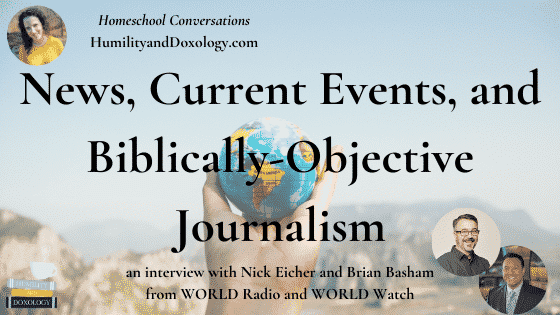
Check out all the other interviews in my Homeschool Conversations series!
